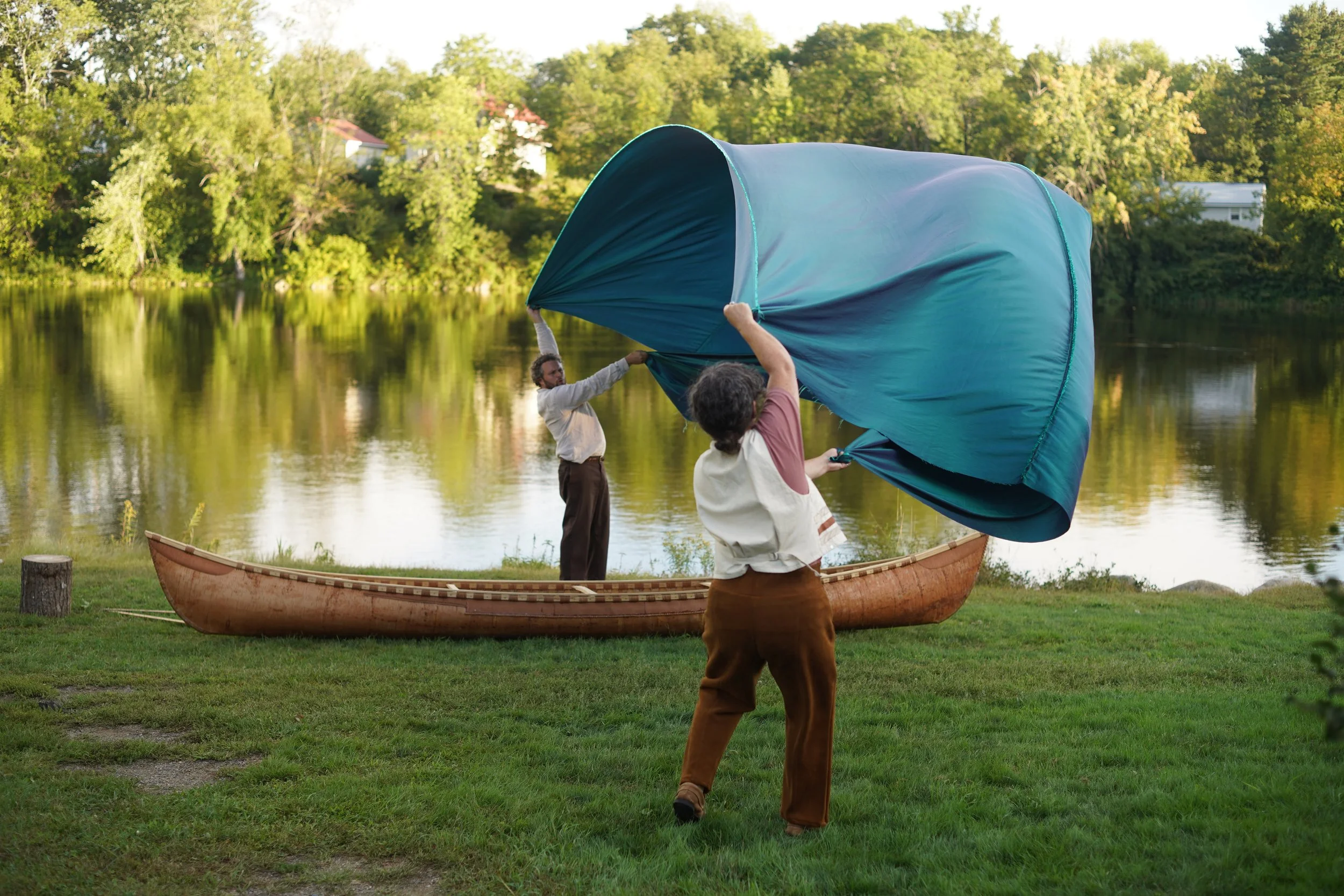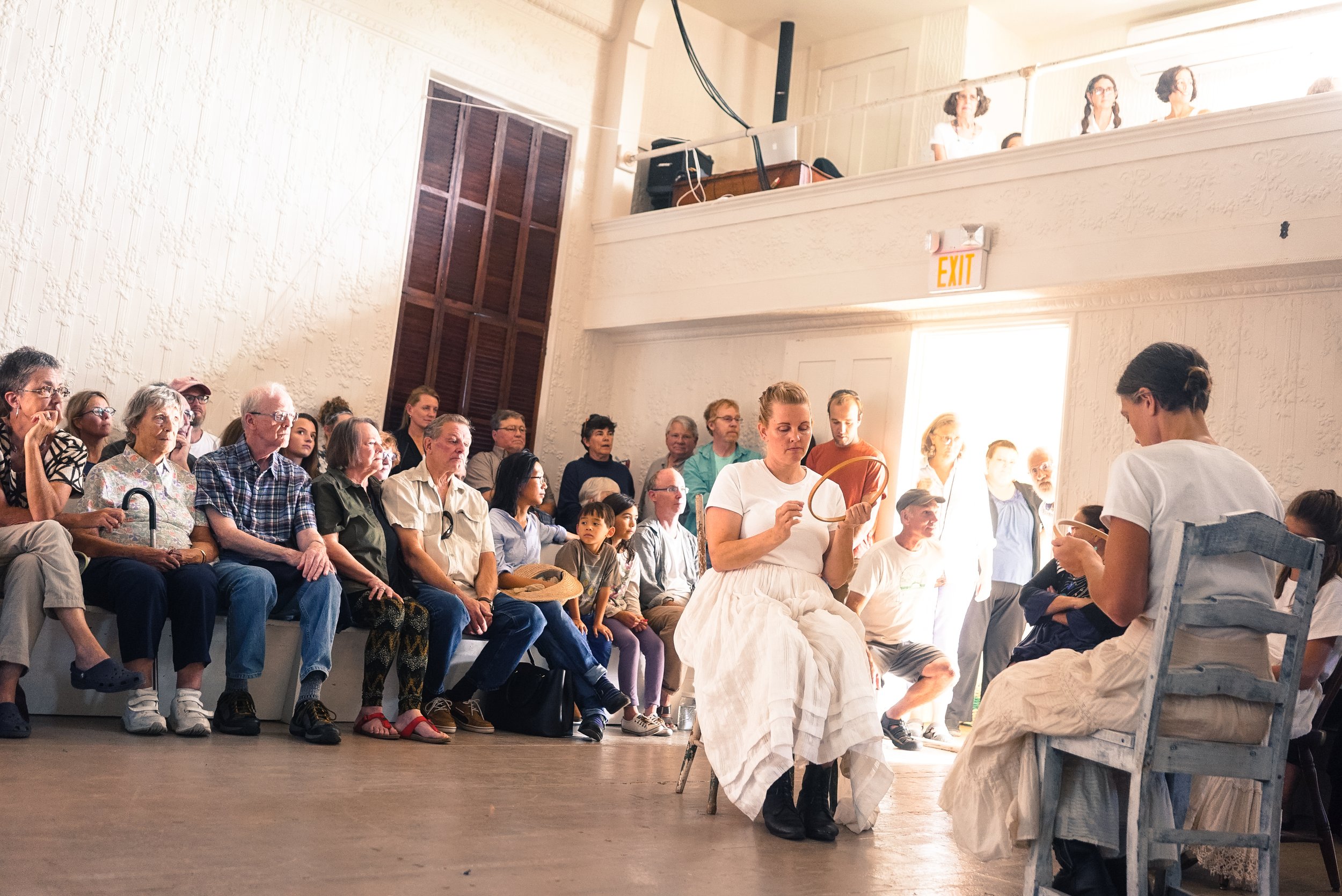where the river widens | panawáhpskə́wihtəkʷ, Indian Island, Penobscot Nation 2023 | photo by Dan Rajter | video by Juliette Sutherland
“With the river and ever-changing sky behind them, they creatively placed the Land Claims within a much longer arc of time, laying bare some often hidden truths about what has happened here in the Dawnland. The organic, non-linear form of this performance felt like a deep acknowledgement of interconnectedness, of people and land, past and present, sovereignty and wellbeing.”
where the river widens is an original, community-devised play made by, for, and with Wabanaki people, directed + co-facilitated by Kate Russell. Inspired by Wabanaki REACH’s oral history project: Beyond the Claims– Stories from the Land & the Heart, the play incorporates the voices of storytellers sharing their lived experience of the historic Maine Indian land claims. where the river widens is a poetic, spare, lyrical movement through stories, place, and time along the Penobscots’ ancestral river panawáhpskə́wihtəkʷ on Alnabe Menahan, Indian Island, home of the Penobscot Nation.
The Emigrant drowns in The Royal Tar, Misty Mountain Singers “Home is the Sailor”, Burnt Cove Church, Deer Isle, Maine, Wabanaki land 2018
The Royal Tar | Burnt Cove Church, Deer Isle, Maine, Wabanaki land 2018 | photos by Dan Rajter
“I was so moved by the experience, and it was truly magical in so many ways. There are rare moments when a piece is truly transformative, and The Royal Tar was certainly one of them. From the sound that emanated from the balcony to the elephant whose sensitivity and pathos were well beyond the years of the young actor, to the simplest means of two pieces of fabric that somehow felt more real than water itself– it was extraordinary.”
The Royal Tar was conceived, directed and written by Kate Russell, and devised with the community ensemble. Fionnuala, who has never learned to swim, leaves the Hebrides for Boston, boarding the fated planks of the Royal Tar with her father, only to wash up along the shores of Deer Isle– alive and alone. The performance took place inside an old one-room New England church on an island in Maine. This one room would take us from Deer Isle to St. Kilda to St. John and back again, becoming the last character in the play– the ship itself. Three chairs strewn about the church became our sewing circle; then, the animals' cages; next, detritus floating in the waves; and, finally, a rocky shoal. The Royal Tar was staged using the entire church as a theatre, from front door to pulpit. The audience was seated on both sides of the playing space like a tennis court. The chorus sang from a balcony above, which doubled as the prow of the ship.
A Midsummer Night’s Dream by William Shakespeare | Carding Brook Farm, Brooklin, Maine, Wabanaki land 2021 | photos by Dan Rajter
“So beautifully and seamlessly done. You gave Bottom permission to weave together the threads of all his experiences and honor his communion with the fairy world, turning what in the original play was merely mischief and folly into a profound and solemn overturning of patriarchy in a meditation toward healing the chaos wrought by war, infidelity and aggression— essentially proposing a new world order. Wow— this play will have a lasting effect on our collective consciousness.”
Shakespeare’s A Midsummer Night's Dream directed by Kate Russell was performed outdoors at Carding Brook Farm in Brooklin, Maine, Wabanaki territory. An epic fight in Fairyland has thrown nature into chaos. Unwitting lovers flee the rigid Acadian court for the woods where magic and upheaval abound. All the while, a band of earnest artisans are hell-bent on crafting their play– from a dream. Our Threadbare Dream was set in Acadia across the rolling hills of a quiet, local farm. The production traveled heartily across the grounds– beginning with a walk through an orchard to an Acadian market, a slope up to the palace gardens, a stroll through the village to Quince's woodshop, a quick respite at the threshold of Fairyland, a walk uphill to the magical woods and back again to the Palace stage for the performance of Bottom's Dream– the Mechanicals’ very own devised creation inspired by Bottom’s transformation + love for Titania.
Mackerel Sky, a new play by Jon Ellsworth | Carding Brook Farm, Brooklin, Maine, Wabanaki land 2021 | photos by Dan Rajter
“What a wonderful play and production. I felt so lucky to have happened upon it. And once I took in the performance, I thought the next obvious thought: wasn’t it meant to be seen by more people (even though I doubt that the experience of seeing it right there at the farm could ever be duplicated completely)?”
A grieving family wrestles with the changing times that seem to have finally reached rural Maine. The '60s are over, and the Vietnam War is still on, but a movement downeast brings young folks back to the land, and a breath of fresh air. As the world slowly emerged from the pandemic, Threadbare produced the world premiere of Mackerel Sky, a new play by Maine farmer, timberframer + playwright Jon Ellsworth for its 2021 Wonder On summer season. The play was developed + directed by Kate Russell, and performed outdoors at the Carding Brook Farm barn in an intimate 3/4 thrust. The action took place all around the audience, from the backyard clothesline to the center stage “garage”, and occasional interior of the barn itself.
or, The Whale artwork by Jonathan Fetter-Vorm
or, The Whale by Kate Russell | The Waterfront Museum, Brooklyn, New York, Lenapehoking, 2015 | Lighting by David Sexton, Costumes by James Veloria | photos courtesy of Threadbare Theatre Workshop
“Combining the gravity of Moby-Dick with the accessibility of a live small-ensemble play, and, well, the fact that it all takes place aboard the National Registry listed Lehigh Valley Barge #79, or, The Whale takes a wholly different approach to Melville’s epic... the eight person play’s soliloquies are reminiscent of Shakespeare and blend his influence into the story and the writing. The acting is commanding and open, the writing sharp and clear. All this supported by subtle and masterful sound and lighting design, creates an immersive and powerful theatre experience.”
or, the Whale, written + directed by Kate Russell, is an original stage adaptation + queer reimagining of Moby-Dick, Melville’s prophetic novel about the rise of an American demagogue. It was performed in the Red Hook Channel aboard The Waterfront Museum, an old railroad barge from the Lighterage era. This intimate floating space brought us aboard The Pequod and inside the belly of the whale; giving us leeway to embody an epic story in a simple way, on the cusp of history and the sea. From the program note: “If you’re reading this, you’ve mapped the same hejira Ishmael made to get the hell out of the city and catch the wind in his lonesome sails. We’ll meet you there with hands for harpoons, chowder bowls for boiling blubber, and actors wearing many hats. Hear the waves lapping, feel your body sway as your feet kiss old pines from the same age Melville penned his classic and we were lighting the industrial revolution and the world on the backs of our fellow mammals– The Whale.”
“Her work possesses the rare quality of conjuring forth vivid, magical, and profound performances from the local cast, leaving an audience in awe.”

































